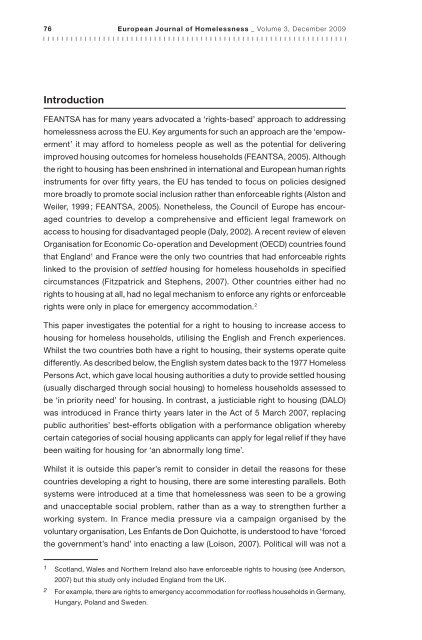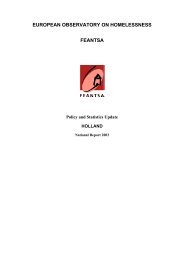Part A - Feantsa - Horus
Part A - Feantsa - Horus
Part A - Feantsa - Horus
Create successful ePaper yourself
Turn your PDF publications into a flip-book with our unique Google optimized e-Paper software.
76 European Journal of Homelessness _ Volume 3, December 2009<br />
Introduction<br />
FEANTSA has for many years advocated a ‘rights-based’ approach to addressing<br />
homelessness across the EU. Key arguments for such an approach are the ‘empowerment’<br />
it may afford to homeless people as well as the potential for delivering<br />
improved housing outcomes for homeless households (FEANTSA, 2005). Although<br />
the right to housing has been enshrined in international and European human rights<br />
instruments for over fifty years, the EU has tended to focus on policies designed<br />
more broadly to promote social inclusion rather than enforceable rights (Alston and<br />
Weiler, 1999 ; FEANTSA, 2005). Nonetheless, the Council of Europe has encouraged<br />
countries to develop a comprehensive and efficient legal framework on<br />
access to housing for disadvantaged people (Daly, 2002). A recent review of eleven<br />
Organisation for Economic Co-operation and Development (OECD) countries found<br />
that England1 and France were the only two countries that had enforceable rights<br />
linked to the provision of settled housing for homeless households in specified<br />
circumstances (Fitzpatrick and Stephens, 2007). Other countries either had no<br />
rights to housing at all, had no legal mechanism to enforce any rights or enforceable<br />
rights were only in place for emergency accommodation. 2<br />
This paper investigates the potential for a right to housing to increase access to<br />
housing for homeless households, utilising the English and French experiences.<br />
Whilst the two countries both have a right to housing, their systems operate quite<br />
differently. As described below, the English system dates back to the 1977 Homeless<br />
Persons Act, which gave local housing authorities a duty to provide settled housing<br />
(usually discharged through social housing) to homeless households assessed to<br />
be ‘in priority need’ for housing. In contrast, a justiciable right to housing (DALO)<br />
was introduced in France thirty years later in the Act of 5 March 2007, replacing<br />
public authorities’ best-efforts obligation with a performance obligation whereby<br />
certain categories of social housing applicants can apply for legal relief if they have<br />
been waiting for housing for ‘an abnormally long time’.<br />
Whilst it is outside this paper’s remit to consider in detail the reasons for these<br />
countries developing a right to housing, there are some interesting parallels. Both<br />
systems were introduced at a time that homelessness was seen to be a growing<br />
and unacceptable social problem, rather than as a way to strengthen further a<br />
working system. In France media pressure via a campaign organised by the<br />
voluntary organisation, Les Enfants de Don Quichotte, is understood to have ‘forced<br />
the government’s hand’ into enacting a law (Loison, 2007). Political will was not a<br />
1 Scotland, Wales and Northern Ireland also have enforceable rights to housing (see Anderson,<br />
2007) but this study only included England from the UK.<br />
2 For example, there are rights to emergency accommodation for roofless households in Germany,<br />
Hungary, Poland and Sweden.




